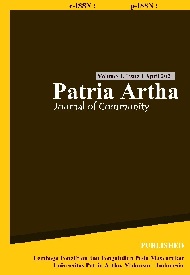Pencegahan Penyakit Infeksi Menular Melalui Edukasi PHBS Pada Masyarakat RW.02 Jungge, Kelurahan Bontoparang, Kabupaten Gowa
Abstract
This service aims to provide education regarding how to prevent the emergence of infectious diseases by implementing PHBS cultural practices to the community of RW.02 Jungge. This service is carried out in the Bontoala neighborhood, Bontoparang Village, Gowa Regency. The author uses several stages in the process of service activities, including: the preparation stage, the implementation stage, and the evaluation stage. The service activity was carried out on March 9, 2022, by lecturers and students of the Faculty of Health, Patria Arta University.D uring the service process, the author found that in the preparation stage there were several gaps related to the social conditions of the RW.02 Jungge community such as social status, profession, age, educational background, economic, social, cultural, and health conditions that made the writer decide to use an educational approach. theory and practice to introduce about PHBS. Then in the second stage, namely implementation, the author and his friends did heart exercise, then continued with theoretical education regarding the importance of PHBS and how to apply PHBS using a persuasive approach, panel discussion and door to door methods. And in the third stage or evaluation stage, the writer together with other friends did a cross check by asking the RW residents one by one. 02 Jungge regarding the results and benefits of this service activity. The implementation of PKM was successfully carried out using an educational approach based on theory and practice, obtained by RW residents. O2 Jungge, Gowa Regency by knowing, understanding, and being able to prevent infectious infectious diseases by implementing PHBS.
Keywords: Infectious infectious diseases, PHBS EducationFull Text:
75 - 83References
Badan Penelitian dan Pengembangan Kesehatan KEMENKES RI. (2018). Hasil Utama RISKESDAS 2018. Jakarta Selatan: Kementerian Kesehatan Republik Indonesia.
Dwiputra, K. O. (2019, oktober 09). Dampak Buruk BAB Sembarangan bagi Kesehatan. Retrieved from Klikdokter: https://www.klikdokter.com/info-sehat/read/3633676/dampak-buruk-bab-sembarangan-bagi-kesehatan
Hartono, R. (2008). Penanganan Dan Pengolahan Sampah. Bogor: Penebar Swadaya.
Kementerian Kesehatan Republik Indonesia. (2015). Info DATIN : Pembinaan Kesehatan Olahraga di Indonesia. Jakarta Selatan: Kementerian Kesehatan Republik Indonesia.
Margarini, E., & Anindita, M. (2021, Desember 21). Gerakan Perilaku Hidup Bersih dan Sehat dalam Data Riset Kesehatan Dasar. Retrieved from Kementrian Kesehatan Direktorat Promosi Kesehatan Dan Pemberdayaan Masyarakat: https://promkes.kemkes.go.id/gerakan-perilaku-hidup-bersih-dan-sehat-dalam-data-riset-kesehatan-dasar
Safitri, H. I., & Harun. (2021). Membiasakan Pola Hidup Sehat dan Bersih pada Anak Usia. Jurnal Obsesi : Jurnal Pendidikan Anak Usia Dini, 385 - 394.
Indonesia, 2008, Undang-Undang Republik Indonesia Nomor 18 Tahun 2008 Tentang Pengelolaan Sampah, Lembaran Negara Republik Indonesia Tahun 2008 Nomor 69, Sekretariat Negara, Jakarta
Indonesia, 2014, Peraturan Menteri Kesehatan Republik Indonesia Nomor 3 Tahun 2014 Tentang Sanitasi Total Berbasis Masyarakat, Berita Negara Republik Indonesia Tahun 2014 Nomor 193, Sekretariat Negara, Jakarta
DOI: https://doi.org/10.33857/pajoco.v2i2.632
Refbacks
- There are currently no refbacks.
Copyright (c)
View My Stats
Editorial Office
Jl.Tun Abdul Razak (Hertasning Baru), Poros Makassar - Gowa Kode Pos 92113, Sulawesi Selatan, Indonesia. Email : pajoco@patria-artha.ac.id
 This work is licensed under a Creative Commons Attribution-NonCommercial-ShareAlike 4.0 International License.
This work is licensed under a Creative Commons Attribution-NonCommercial-ShareAlike 4.0 International License.












